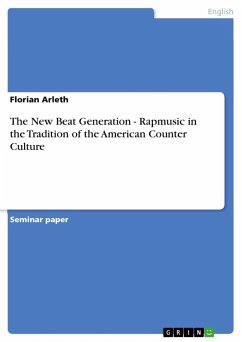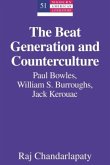Seminar paper from the year 2010 in the subject English Language and Literature Studies - Culture and Applied Geography, grade: 2,0, University of Heidelberg (Anglistisches Seminar), course: PS II "The Post-War American Counter Culture", language: English, abstract: As soon as rap music had proven to be something more than a short lived youth phenomenon it began to be acknowledged as an American counter-culture - maybe because of the often controversial lyrics, maybe because of the socio-cultural background of the participants. This paper raises the question if American rap music can be seen as standing in the tradition of the Beat Generation, an artistic and ideological movement that is treated as the foundation of the term Counter Culture as it will be used in the further progress.The definition of this term is based on three texts: "The Culture of Spontaneity" by Daniel Belgrad, "The White Negroe" by Norman Mailer and "The Philosophy of the Beat Generation" by Jack Kerouac. These works have in common that they are all concerned with the phenomenon of the American Counter-Culture in general and with the Beat Generation in particular - be it from Kerouac's personal point of view, from a contemporary one like Mailer's, or from the scholarly perspective of Belgrad. They each deal with different aspects of this movement and in this give a broad definition of it, including ideological as well as formal points.These individual notions are then used to construct a basis for a comparison. They are compared to respective aspects in rap music, with no special regard to decades, geographic focal points or stylistic tendencies. The rap culture is rather seen as an entity, the different artists as manifestations of its ideas. This means that the personal views and works of rap musicians are as important as their common denominator and are treated likewise. Yet there needs to be a distinction between those rap artists that create in accordance to the original ideas of Hip Hop and those who compromised on their musical integrity, whether due to the taste of the main stream or to artistic misleadings. The term 'Counter Culture' itself proves to be very helpful here, for it already implies that the followers of this movement oppose the 'Culture' of the mainstream and can therefore not be part of it, like the latter group of rap artists is.Finally, the aim of this paper is to trace the similarities of the two movements, but also to highlight the differences - the reasons why rap Music should not be considered as part of the American Counter-Culture, as a new Beat Generation.
Hinweis: Dieser Artikel kann nur an eine deutsche Lieferadresse ausgeliefert werden.
Hinweis: Dieser Artikel kann nur an eine deutsche Lieferadresse ausgeliefert werden.








